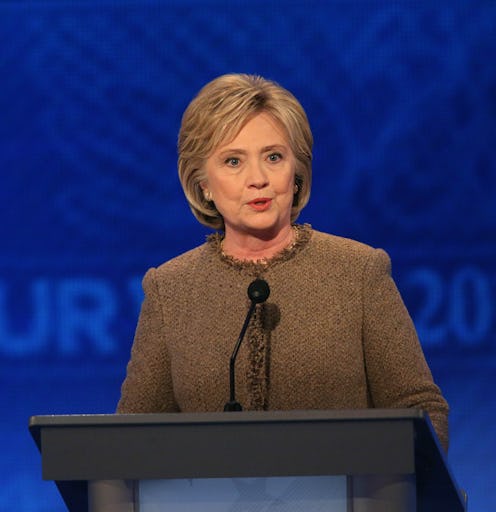News
Hillary Clinton's Closer Proves She Knows She's #1
On Saturday night, for the third time in this presidential primary process, the Democratic candidates faced each other on stage for a nationally televised debate. You might have seen or heard when the other two went down — even though the Democratic debates aren't nearly as chaotic, rambunctious, or ratings magnets like the Republican ones have been, they've provided an intriguing, more sober-headed look into the different candidates' strategies and styles, and tonight was no exception. So in case you missed it, why not read Hillary Clinton's closing statement from the third debate?
Closing statements can be very revealing of just where a campaign feels it's at, and what core sentiments or values need to be hammered home when it's time to get that last word. In her previous two closing statements, that message was plainly clear — both times, Clinton make direct pleas to her prospective supporters, possibly trying to counter that pesky "inevitability" narrative that exists around her.
And on Saturday night, she was similarly eager to ask for the support of the Democratic base, rather than toss any major punches in her closing moments — although Vermont Sen. Bernie Sanders has posed an unexpectedly stiff challenge to her, especially in New Hampshire where he still holds a lead in the polls, she's been loathe to attack him too directly or forcefully. And she concluded with a line sure to draw some applause: "May the Force be with you."
On January 20, 2017, the next President of the United States will walk into the White House. If, heaven forbid, that next president is a Republican, I think it's pretty clear we know what will happen. A lot of the rights that have been won over years, from women's rights, to voter rights, to gay rights, to worker rights, will be at risk. Social security, which Republicans call a ponzi scheme, may face privatization. Our vets may see the VA hospital that needs to be improved and made better for them turned over to privitzation. Planned Parenthood will be defunded.
The list goes on, because the differences are so stark. You know, everybody says elections are important, and there's truth to that. But this is a watershed election. I know how important it is that we have a Democrat succeed President Obama in the White House. And I will do all that I can in this campaign to reach out and explain what I stand for and what I will do as president. You know, I became a grandmother 15 months ago, and so I spent a lot of time thinking about my granddaughter's future. But as president, I will spend even more time thinking about the futures of all the kids and the grandchildren of this country. Because I want to make sure every child has a chance to live up to his or her God-given potential. If you will join me in this campaign, we will make that a mission. Thanks you, good night, and may the Force be with you.
There will certainly be much debate about who won and lost this debate, and it'll be had along many different lines: Who had the facts on their side, who made the strongest rhetorical showing, who was best able to adapt to the ever-changing news cycle, and so forth. And when it comes to crafting a debate strategy, having the pole position matters. With dominant front-runners like Clinton you'll often see less risk-taking, secure in the knowledge that all that's needed is to keep coasting at a steady level, while hard-charging challengers like Sanders have to stir up a little more fighting spirit. He definitely thought so — Saturday was by far Sanders’ most combative, impassioned performance so far.
And as Clinton's statement highlighted, this political reality was also out in full force for her. No need to devote any of your closing time to lobbing attacks or referencing your inter-party rivals, after all, when you already have as clear a pathway to the nomination as Clinton does. And make no mistake, for all of Sanders' big crowds and stirring stump speeches, he's still in a very bad way — he trails Clinton nationally by approximately 25 points right now, and he's facing seemingly insurmountable 40-plus point deficits in crucial primary states like South Carolina and Florida.
